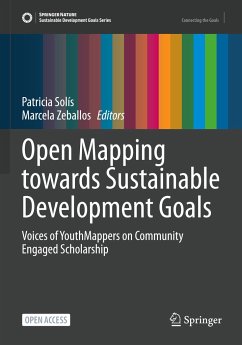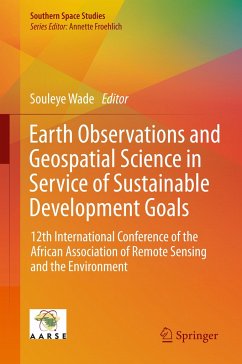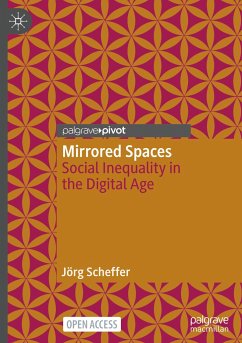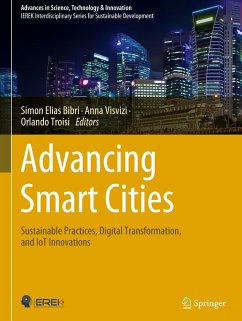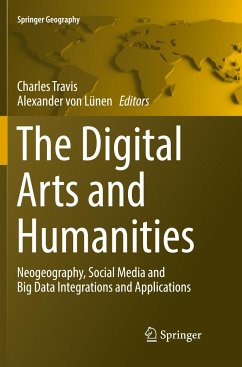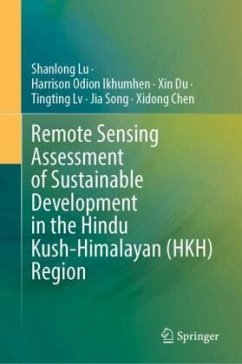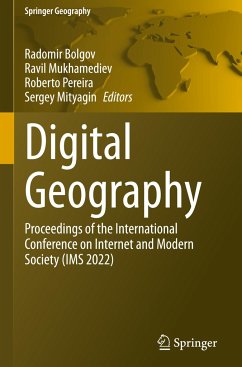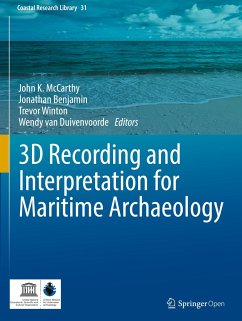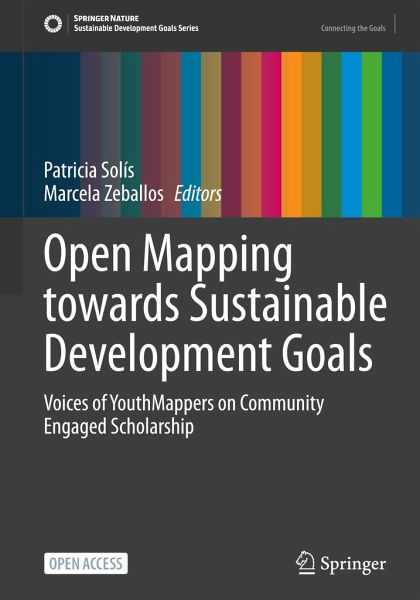
Open Mapping towards Sustainable Development Goals
Voices of YouthMappers on Community Engaged Scholarship
Herausgegeben: Solís, Patricia; Zeballos, Marcela
Versandkostenfrei!
Versandfertig in 6-10 Tagen
38,99 €
inkl. MwSt.

PAYBACK Punkte
19 °P sammeln!
This collection amplifies the experiences of some of the world's young people who are working to address SDGs using geospatial technologies and multi-national collaboration. Authors from every region of the world who have emerged as leaders in the YouthMappers movement share their perspectives and knowledge in an accessible and peer-friendly format. YouthMappers are university students who create and use open mapping for development and humanitarian purposes. Their work leverages digital innovations - both geospatial platforms and communications technologies - to answer the call for leadership...
This collection amplifies the experiences of some of the world's young people who are working to address SDGs using geospatial technologies and multi-national collaboration. Authors from every region of the world who have emerged as leaders in the YouthMappers movement share their perspectives and knowledge in an accessible and peer-friendly format. YouthMappers are university students who create and use open mapping for development and humanitarian purposes. Their work leverages digital innovations - both geospatial platforms and communications technologies - to answer the call for leadership to address sustainability challenges.
The book conveys a sense of robust knowledge emerging from formal studies or informal academic experiences - in the first-person voices of students and recent graduates who are at the forefront of creating a new map of the world. YouthMappers use OpenStreetMap as the foundational sharing mechanism for creating data together. Authorsimpart the way they are learning about themselves, about each other, about the world. They are developing technology skills, and simultaneously teaching the rest of the world about the potential contributions of a highly connected generation of emerging world leaders for the SDGs. The book is timely, in that it captures a pivotal moment in the trajectory of the YouthMappers movement's ability to share emerging expertise, and one that coincides with a pivotal moment in the geopolitical history of planet earth whose inhabitants need to hear from them.
Most volumes that cover the topic of sustainability in terms of youth development are written by non-youth authors. Moreover, most are written by non-majoritarian, entrenched academic scholars. This book instead puts forward the diverse voices of students and recent graduates in countries where YouthMappers works, all over the world. Authors cover topics that range from water, agriculture, food, to waste, education, gender, climate action and disasters from their own eyes in working with data, mapping, and humanitarian action, often working across national boundaries and across continents. To inspire readers with their insights, the chapters are mapped to the United Nations 17 Sustainable Development Goals (SDGs) in ways that connect a youth agenda to a global agenda.
With a preface written by Carrie Stokes, Chief Geographer and GeoCenter Director, United States Agency for International Development (USAID).
This is an open access book.
The book conveys a sense of robust knowledge emerging from formal studies or informal academic experiences - in the first-person voices of students and recent graduates who are at the forefront of creating a new map of the world. YouthMappers use OpenStreetMap as the foundational sharing mechanism for creating data together. Authorsimpart the way they are learning about themselves, about each other, about the world. They are developing technology skills, and simultaneously teaching the rest of the world about the potential contributions of a highly connected generation of emerging world leaders for the SDGs. The book is timely, in that it captures a pivotal moment in the trajectory of the YouthMappers movement's ability to share emerging expertise, and one that coincides with a pivotal moment in the geopolitical history of planet earth whose inhabitants need to hear from them.
Most volumes that cover the topic of sustainability in terms of youth development are written by non-youth authors. Moreover, most are written by non-majoritarian, entrenched academic scholars. This book instead puts forward the diverse voices of students and recent graduates in countries where YouthMappers works, all over the world. Authors cover topics that range from water, agriculture, food, to waste, education, gender, climate action and disasters from their own eyes in working with data, mapping, and humanitarian action, often working across national boundaries and across continents. To inspire readers with their insights, the chapters are mapped to the United Nations 17 Sustainable Development Goals (SDGs) in ways that connect a youth agenda to a global agenda.
With a preface written by Carrie Stokes, Chief Geographer and GeoCenter Director, United States Agency for International Development (USAID).
This is an open access book.





